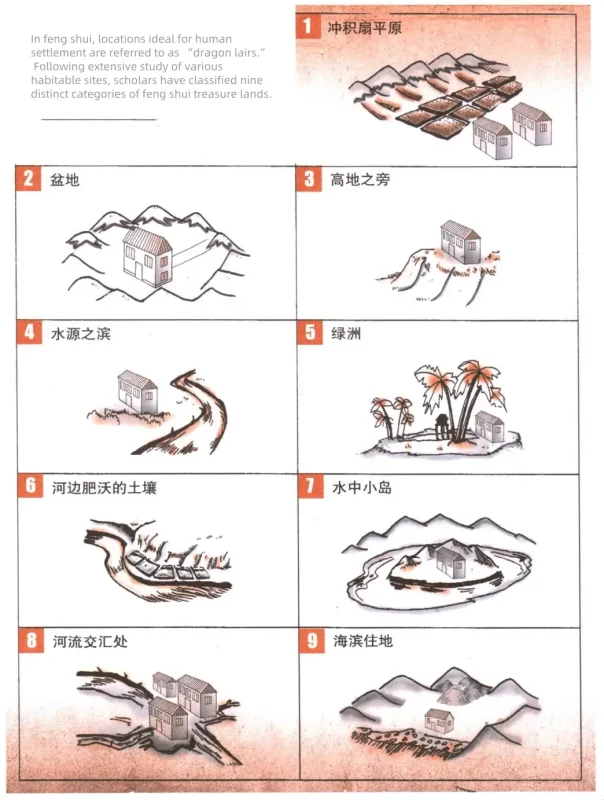Feng Shui for Residential Harmony
The Application of Feng Shui in Residential Architecture
Choosing a Dwelling That Harnesses Nature’s Blessings
In ancient times, people adhered to the belief in prophetic omens and destiny. Before commencing any construction or earth – moving, they meticulously examined the geographical features to determine whether a site “harbored the wind and captured the water.” They then selected locations not only of exquisite natural beauty also but of harmonious essence—places where the union of yin and yang prevailed, much like jewelry that embodies the harmony of yin and yang, and where beneficial energy was naturally concentrated.
The Philosophy of the Unity of Heaven and Man
Ancient scholars recognized that humanity and nature are inextricably linked. This realization is encapsulated in the quintessential Chinese concept of “the unity of heaven and man.” Here, “heaven” refers to the all-encompassing forces of nature, while “man” denotes our tangible, earthly existence. True harmony is achieved only when human beings integrate seamlessly into the natural world.
The Impact of the Living Environment on Human Development
Among all influences on human progress, the quality of one’s living environment is paramount. Feng shui places great emphasis on cultivating a favorable habitat, for such an environment not only promotes physical well-being but also lays the foundation for overall development. For instance, during the Ming dynasty, the prosperous economy and abundant natural resources of the Jiangnan region nurtured a vibrant community of scholars and literati. Many of the top candidates in the imperial examinations hailed from Jiangnan, contributing to a flourishing cultural scene often described as a “bountiful southeastern treasury and a cultural haven of Jiangsu and Zhejiang.” Beyond political, economic, and cultural factors, the natural setting played a crucial role—aptly summarized in the adage, “where nature is resplendent, the land produces extraordinary talents.”
Survival and Feng Shui
The ability of humanity to thrive across generations is closely tied to our choice of habitat, which follows certain natural patterns. Archaeological evidence indicates that early human settlements were predominantly established in basins, alluvial fan plains, river terraces, river confluences, sandy lakebeds, and coastal areas. These locales typically benefit from ample sunlight, natural wind protection, and proximity to water, ensuring an abundance of resources essential for food and hydration—ideal conditions for human survival and development.
The influence of such landforms on local microclimates and ecosystems can be understood as favorable site-selection models, metaphorically referred to as “acupoints” akin to those in human acupuncture. Typically, these sites are encircled by mountains on three or four sides, feature a terrain that is higher in the north than in the south, and form a secluded basin with a balance of shade and sunlight. This archetypal pattern is believed to “harbor the wind and gather energy,” constituting the optimal feng shui configuration for sustaining human life.
Feng Shui as the Science of Habitation
In essence, feng shui is a discipline that examines the “principles of habitation” for humanity. It instructs us on how to identify environments conducive to survival, with the aspiration that favorable feng shui will lead to abundant sustenance, thriving progeny, successful endeavors, and prosperous fortunes.
The Nine Exceptional Feng Shui Sanctuaries
In feng shui, locations ideal for human settlement are referred to as “dragon lairs.” Following extensive study of various habitable sites, scholars have classified nine distinct categories of feng shui treasure lands.

